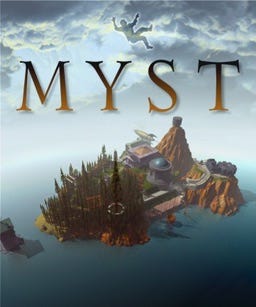So What, Who Cares (vol 2, issue 51) How six things make or break your college education

Hello!
The coolest tweet I got today was from @kirschen,where she pointed me to a blog entry chronicling her experience with her first CD-Rom, From Alice To Ocean. I feel like there's an untapped market for CD-ROM nostalgia. Surely I can't be the only one with fond feelings for Monty Python's Complete Waste of Time.
Are there CD-ROMs you remember fondly as immersive experiences, interesting experiments or simply artifacts of your youth? Dish on them via Twitter or email.
*
I read an interview with Wharton professor Peter Capelli about whether or not colleges should expand their vocational-type majors like casino management, and this particular excerpt stuck with me:
[T]he issue here is that higher education, post-secondary education, is just not well-suited to deliver job training: Getting your first job is probably not ultimately what your college education is supposed to be about.
But for parents, of course, there’s a big issue of how much money you’re spending for this and whether there will be a pay-off at the end of it. So at the moment there’s an awful lot of concern. Parents are worrying, “Is my kid going to get a job?” The employers are complaining, “We want to hire people with a particular set of skills.” And colleges are kind of in the middle, but it’s a peculiar supply chain problem.
What I found to be interesting about this was the college students -- the people with the biggest stake in the question of "Why do you go to college?" -- were being buffeted hither and yon by the competing interests of the people who fund their education, the people providing their education and the people who will presumably benefit from their education.
Why do you go to college? According to recent Gallup research, the 75% of people who thrive after college do so because they have six crucial elements in their college experience:
At least one professor who made them excited about learning
A professor who cared about them as a person
A mentor who encouraged the student to actively conceive of and pursue a plan for the future
A project that took a semester to complete
An internship or other experience that allowed for practical application of classroom instruction
Active engagement in extracurricular activities or campus organizations
So what? The nature of the Gallup research is such that "Do you have a college degree?" is not the beginning and end of the question. The researchers also measured "the degree to which graduates were engaged in their work and thriving in their purpose, social, financial, community, and physical well-being," and getting the big picture on how people are doing. The verdict:
Graduates who hit the mark on experiencing the “Big Six” are significantly more likely than those who didn’t to strongly agree college prepared them for life outside of college, to be considered “thriving” in all five elements of well-being and to be engaged at work.
In other words, a college degree is not a golden ticket. You have to have the six experiences listed above, because those help students cultivate the ability to be engaged in their work and their lives.
Who cares? People who want to help students thrive in college -- and beyond. There is no shortage of coverage on the challenges a first-generation college student faces, from limited knowledge of the college selection process to the feeling that they can't burnish their resumes at the same rate their peers do to negotiating the class signifiers and privileges their classmates take for granted.
(Check out some of the first-person stories on this Metafilter thread.)
These are complicated problems without very many easy solutions. But if the people who reach these kids freshman year can hand them a checklist and say, "Whatever you do, shoot for these six things over the next eight semesters" ... maybe that helps them get more out of college and thrive afterward. The appeal of a checklist is that it provides structure -- and that's something nearly any student could use.
Tell me about your college experience -- how many of the six must-haves did you get? Do you think that your post-college life has been the better or not for having done so? I'm here via Twitter or email.
*

Today's note in pop culture: Have you heard of the Postmodern Jukebox? The premise is simple and charming: Take today's pop and rock hits, then sing them in a style that was popular forty to ninety years ago. Have you ever wanted to see a towering clown in a Pierrot costume sing Lorde's Royals like a torch singer? You will.
The 1970s soul cover of "I Want It That Way" gives the song a knowing, adult swing that the original lacks. And the New Orleans jazz take on "Sweet Child O' Mine" is such a great reinterpretation of G'n'R's "We'd like to be thought of as deep hair-metal guys" ditty. The 1930s-jazz tempo on "Careless Whisper" totally redeems the song for me.
You can gorge on the YouTube channel, book tickets for upcoming concerts, or buy their music in iTunes.
*
Are there typos? I apologize in advance. The only editing class I did not get an A in was copyediting.
Did you miss an issue of So What, Who Cares? The archive is here.
Would you like a run-down of all the books and other pop culture picks ever mentioned in this newsletter? Then check out the Pinterest board. (Note: None of the links are affiliate links; I do not make money off anything I link to.)
If you really like So What, Who Cares?, tell a friend to subscribe.

